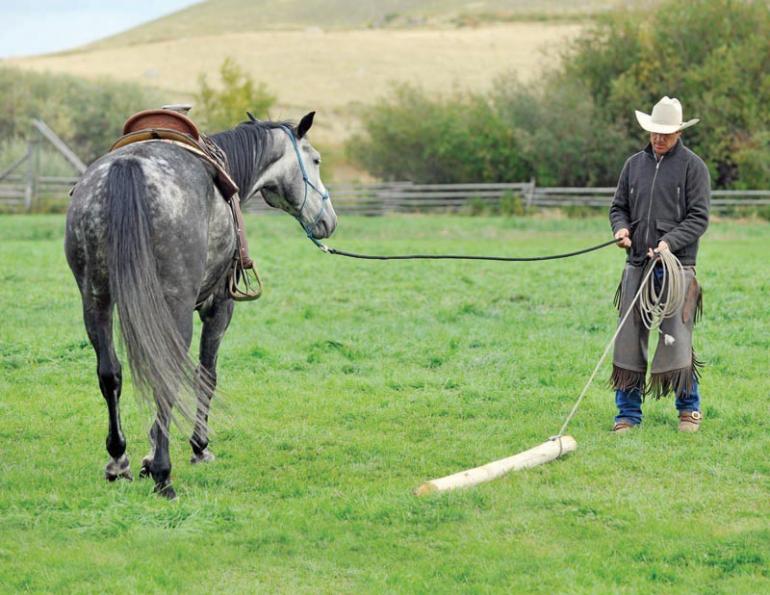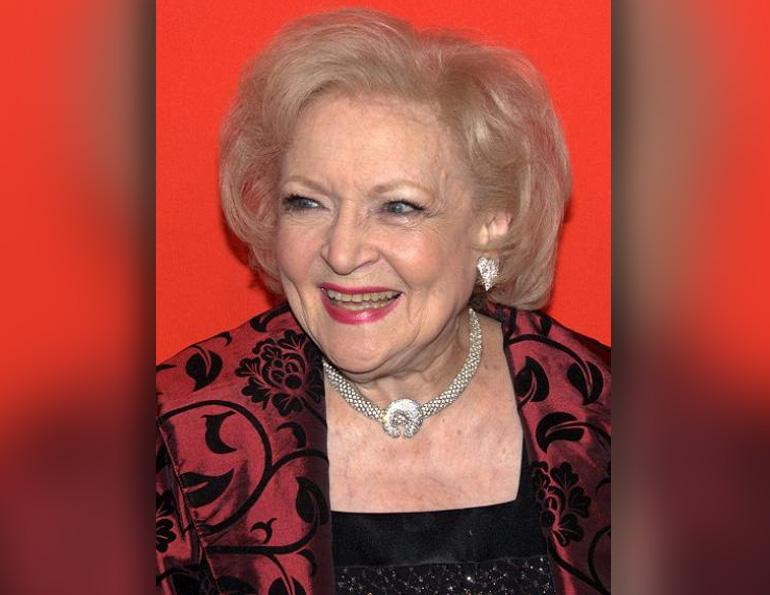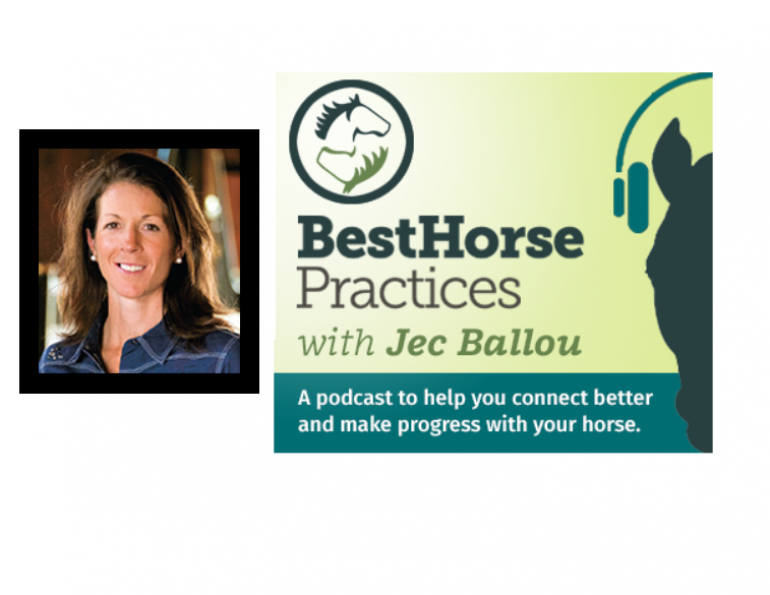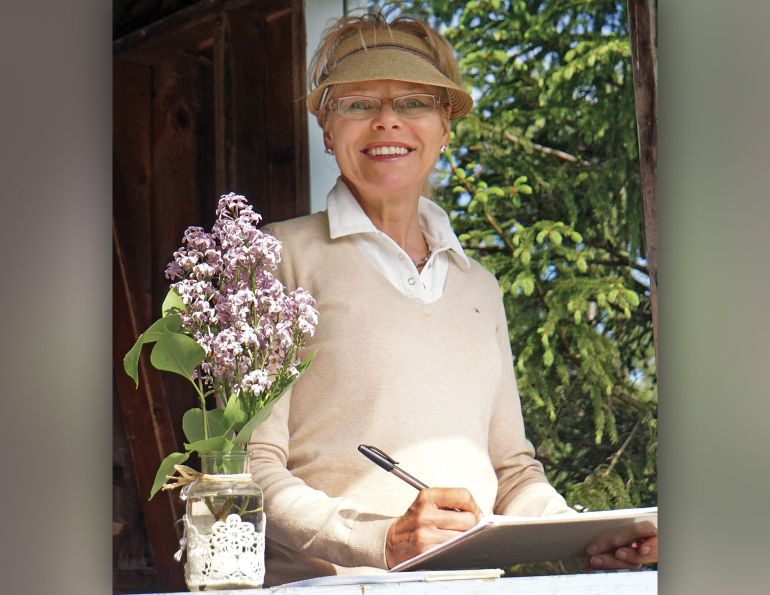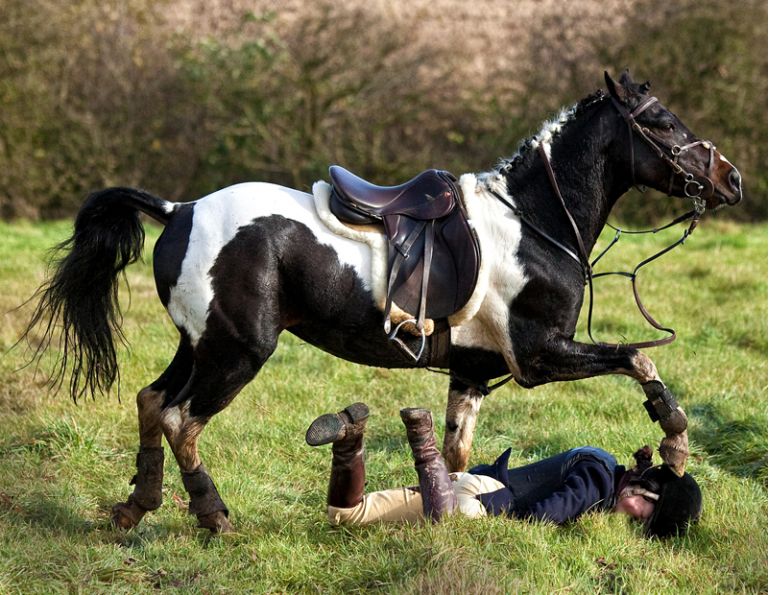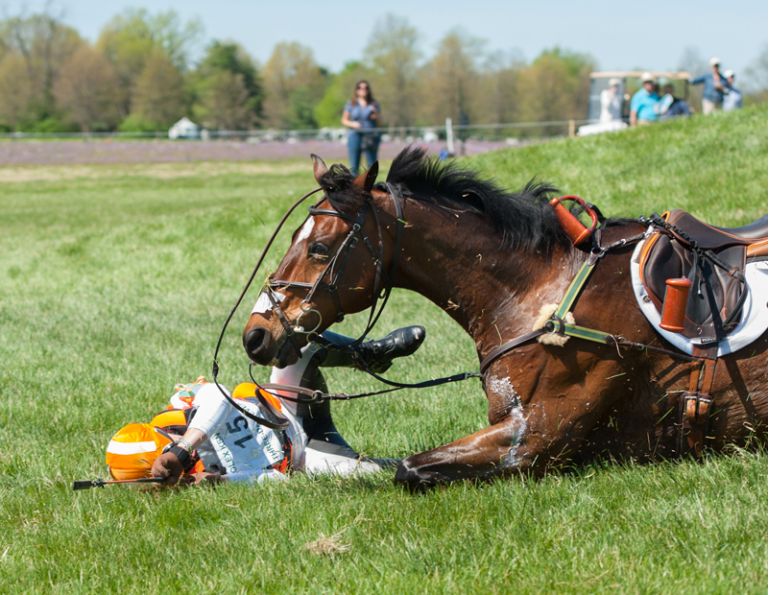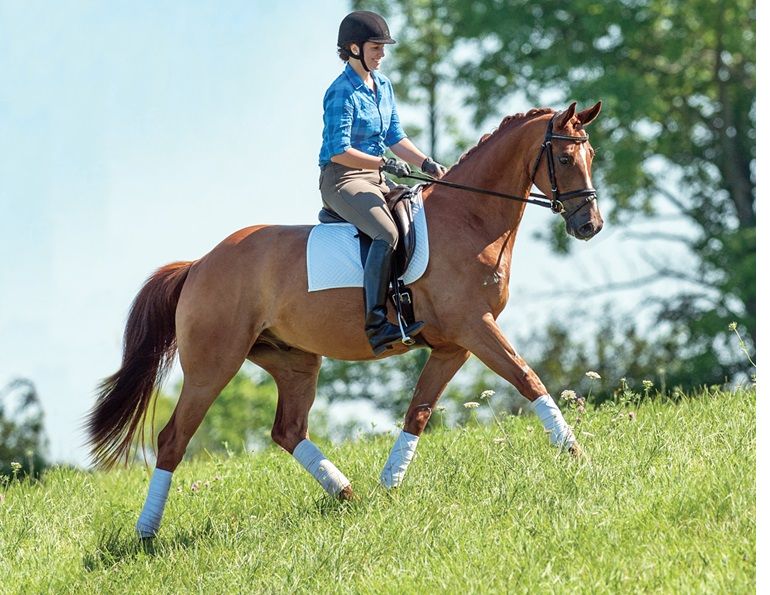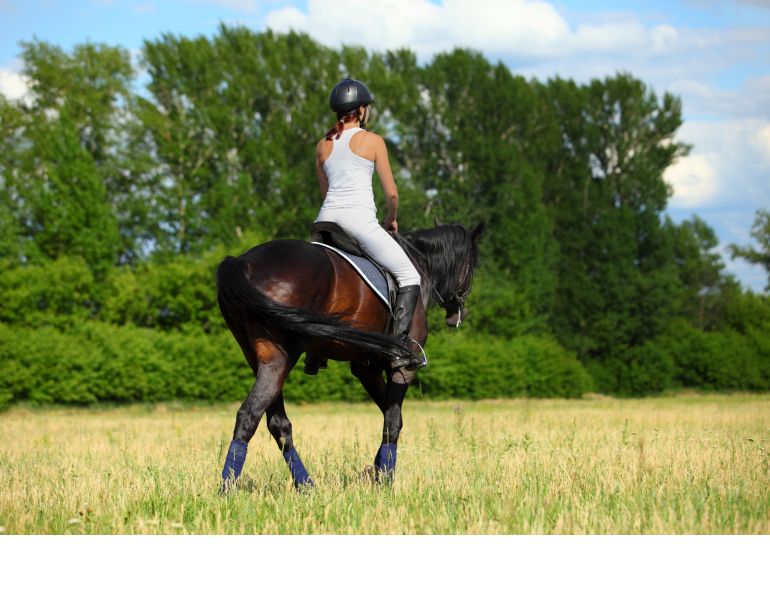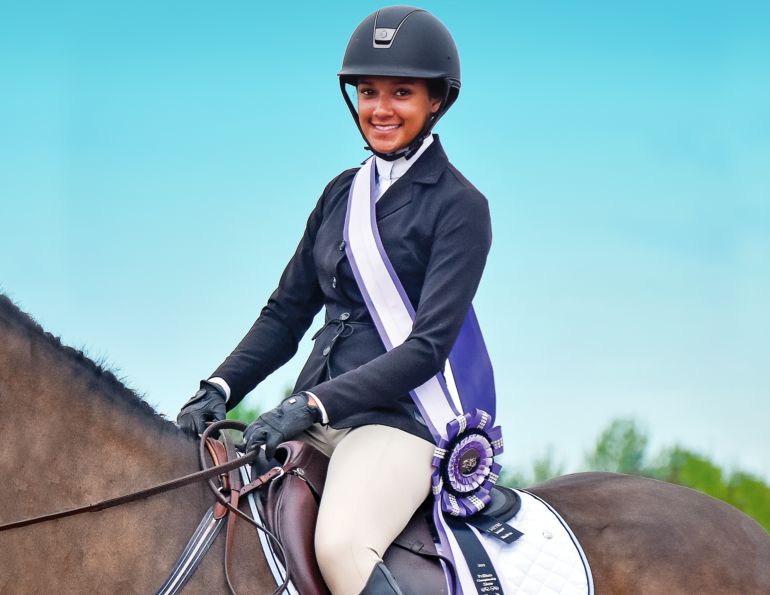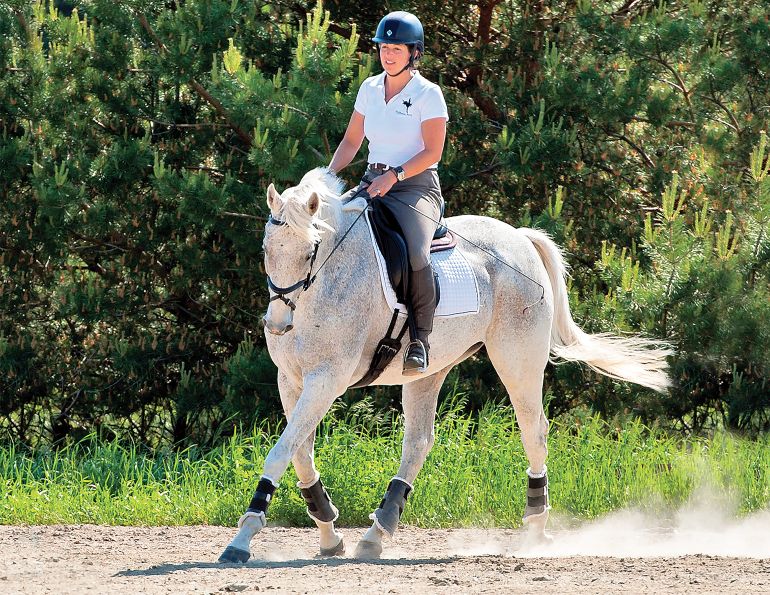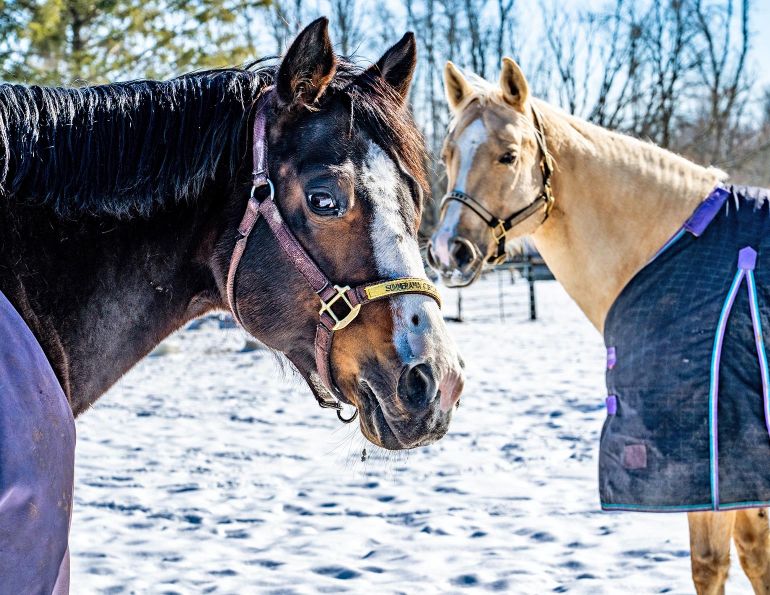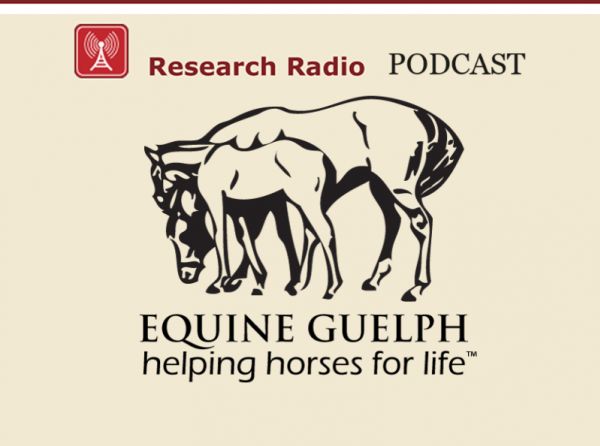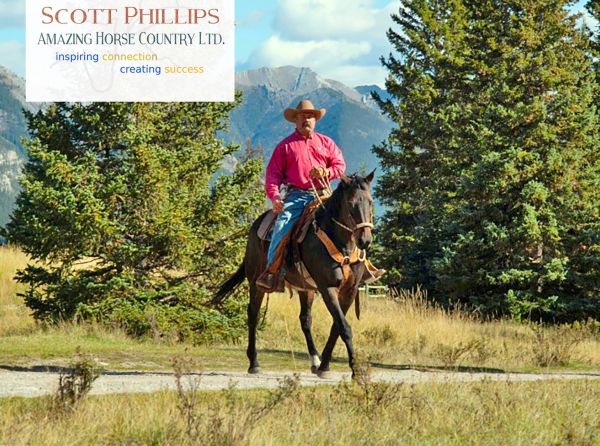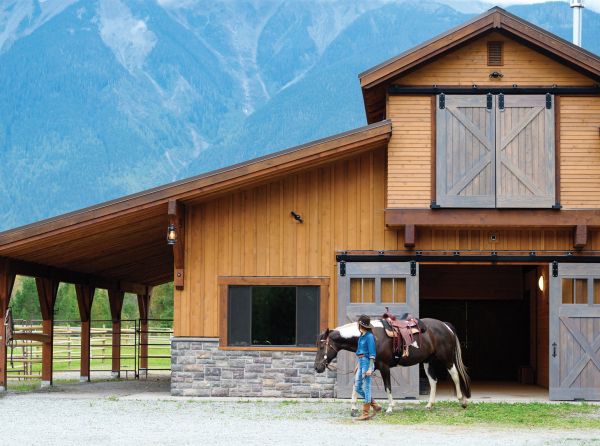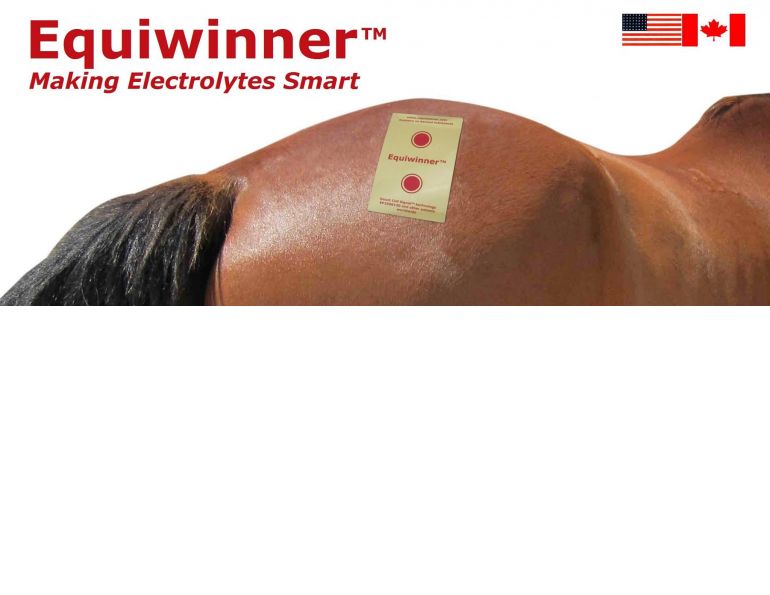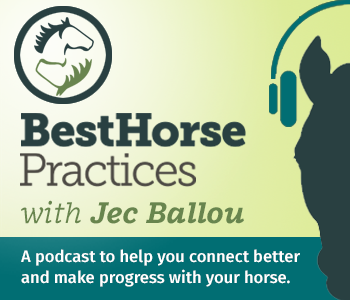Dragging a Log
By Jonathan Field
Helping horses build their confidence in unique ways can prepare them for the unexpected. At any age or with any discipline, I encourage riders to find ways to challenge themselves and their horses by trying new things and teaching them that they can trust you when they feel worried. I see so many horses that are incredibly sheltered by their owners and, as a result, become so fragile that any little thing causes them too much anxiety.
I want to introduce you to a horse I purchased named Bellagio. His barn name is Geo. This seven-year-old Canadian Warmblood has good jumping potential. Even though I wear a cowboy hat, one of the things I love to do is ride horses over fences.
Before Geo and I begin pointing ourselves toward fences, I must first build his confidence so he can trust me when faced with all the pressures that go into a show horse’s life. I’m taking a lot of time with my ground skills and riding foundations to set myself up for success with him in any endeavor, including showing or large liberty demonstrations as well as ranch work.
I don’t know what it is about very sensitive, highly athletic, skeptical and unconfident, horses but I seem to be attracted to them. And that really describes Geo. He is particularly scared of anything around him, especially if something touches his legs. Even when the Western saddle first went on it was a very big deal. When I saw him bucking almost higher than the top rail on the fence, two thoughts ran quickly through my mind. The first was: Man, I’m glad I’m not on that horse. And the second was: Maybe he really can jump well!
Related: Finding Solutions for Equine Behavioural Issues
In today’s session, I want to teach him that ropes and an object like a log moving around him are okay. I need to go through a very progressive series of steps so that neither of us has a wreck. If you don’t understand all the steps or you go through them too quickly, many things can very quickly go wrong.

Above: While leading Geo with the halter and lead with one hand, I am pulling a light fence post with my lariat rope with the other. Geo and I are ready for this and while I know he’s a bit iffy about it, I know him well enough to be confident that it is the next sequential step that he can handle. Photo: Robin Duncan Photography
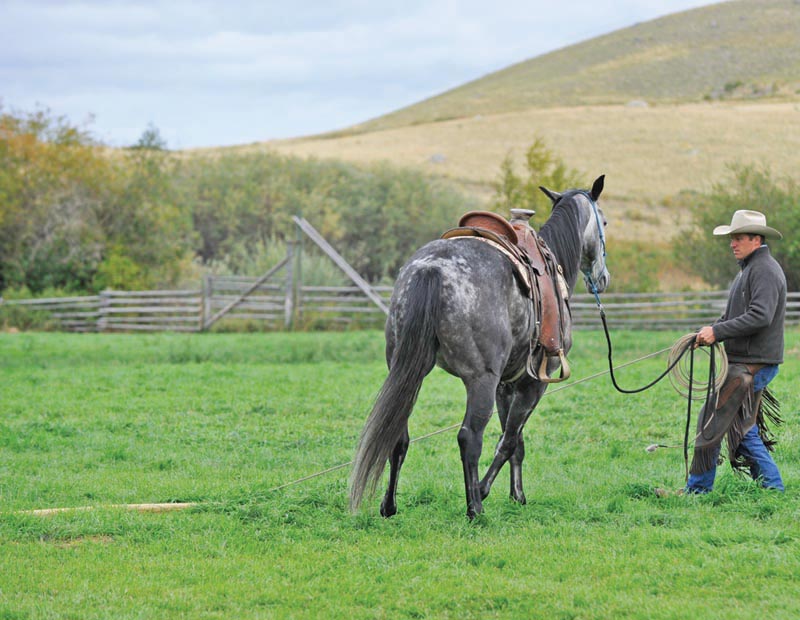
Above: I’ve added a bit of challenge here. You can see now that the log is on his left side and it’s closer to him. As another added challenge, I am intentionally allowing the rope to touch his front leg. By using a light log, I can control exactly where it is and how close it is, slowly bringing it in closer and then letting it retreat away. This allows him time to consider the changes and realize everything is going to be okay.
Whenever you do something like this, don’t focus on how close you can get a scary object to a horse, but rather bring it to the edge of trouble, then retreat away. Your horse will learn more about the situation and won’t consider the object as much of a threat if it regularly goes away. In natural circumstances, the predatory behaviour is continual approach with no retreat, which triggers the horse’s prey responses of flight, fight, and freeze. A continuous approach leads to the edge of trouble and if you unintentionally go over that edge your horse may have a serious reaction. If this happens back off immediately, restart small, and begin building again slowly. Not all is lost; you must methodically build up the confidence and show him through the release (taking the object away) that he is safe. Photo: Robin Duncan Photography
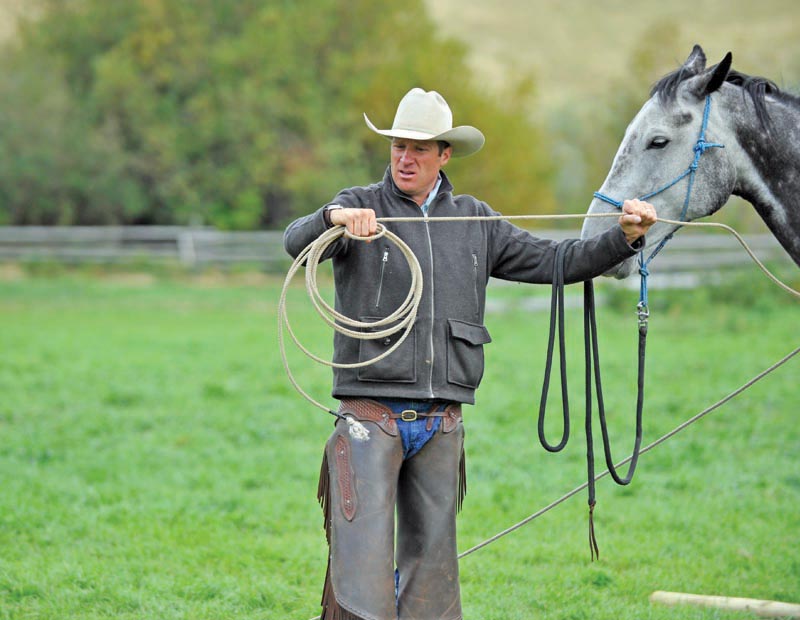
Above: This is NOT correct. When you use a lariat rope you must be sure to properly allow the rope to lengthen by letting coils out. If you hold the rope the wrong way, when the coil tries to pull out it will wrap around your hand and you could get badly hurt. Photo: Robin Duncan Photography
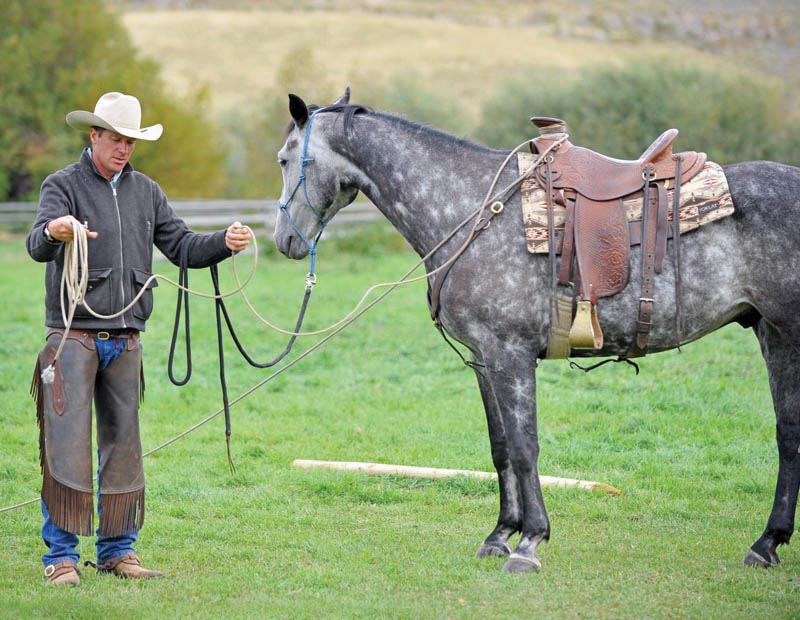
Above: This IS correct. In this photo you can see I have changed the rope over in my right hand and I am allowing the coils to flow out past my fingers. I have taken my lariat rope from the post over the saddle horn once and back to my hand. This increases the difficulty because now Geo has a rope that he can see coming up to the saddle horn. It will make some noise as it moves around the horn and if I want to put enough tension in the rope it will cause him to actually drag the post. The key is that it’s all within my control as to whether or not the rope gets tight enough to pull the post. Never tie off to the horn! Photo: Robin Duncan Photography
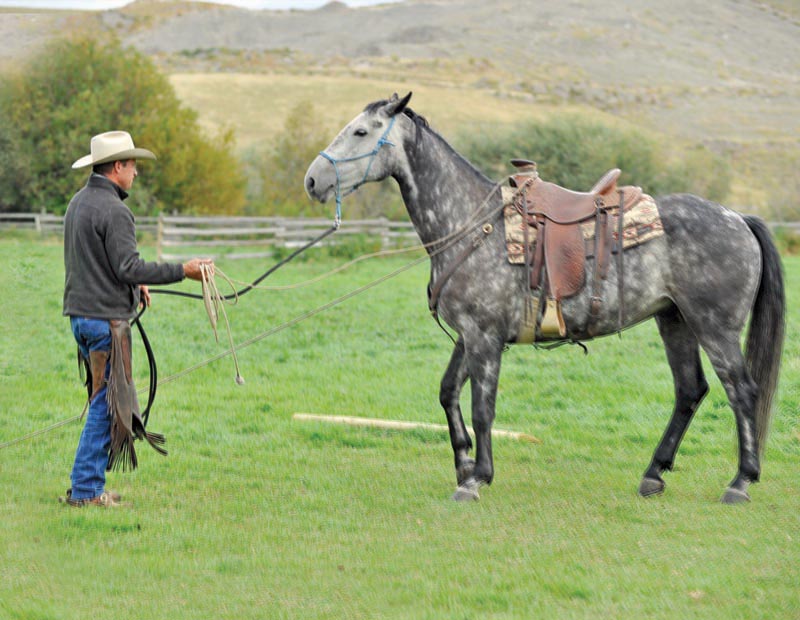
Above: The first thing I’m going to do with the rope around the saddle horn and linked back to me is ask him to back up. Without any tension on the post I can show him the feel of the rope touching his shoulder and the noise of it going around the horn. Notice I am holding the rope so the coils come out through my fingers easily as we extend the distance away from the post. Photo: Robin Duncan Photography
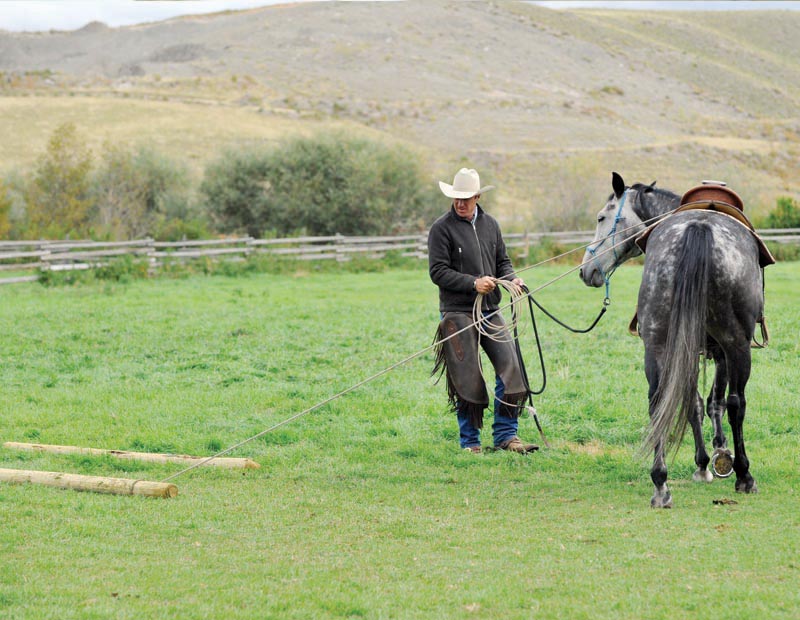
Above: Leading him forward around the log is the next step. I can decide how much pressure I want him to pull by just holding the rope slightly tighter. This will be the first time the log actually moves, which could cause him to worry, so I allow him a lot of space before I tighten the rope enough to actually pull the post. At this stage, I take lots of time on both sides as I ask him to circle around the post. I still don’t want to touch his hindquarter, so when I switch sides to do the same thing on his right side I take the rope off, walk around, and start again.
Safety note: For the safety of both you and your horse, you must be very aware that the lariat rope attached to the log like this does not get around the hindquarters and underneath the tail. A horse can clamp its tail very tightly, then run scared dragging the log. It could be a terrible wreck. Always be aware of this possibility and prevent it from happening. Photo: Robin Duncan Photography
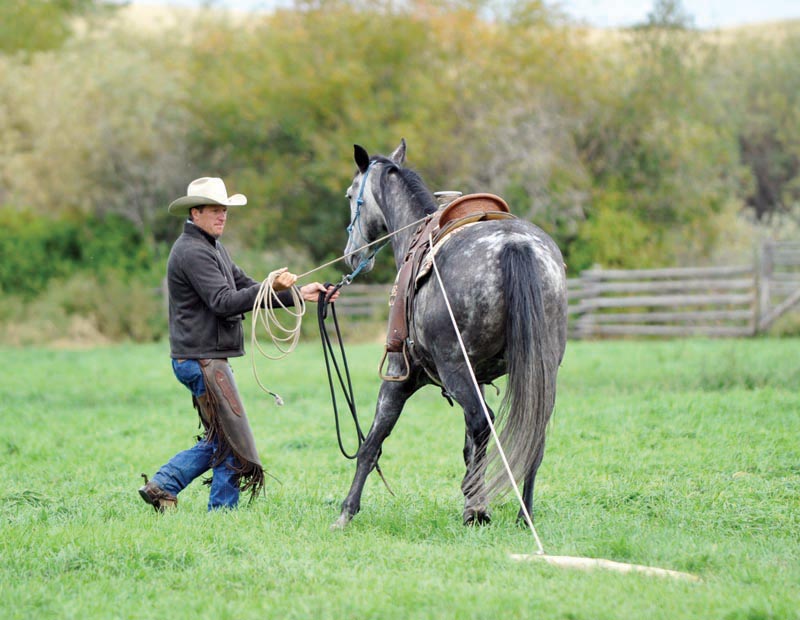
Above: Now I have progressed to the point where I have physically moved in to a much closer range so I can turn his nose away a little bit and allow the rope to touch his hindquarter intentionally. Photo: Robin Duncan Photography
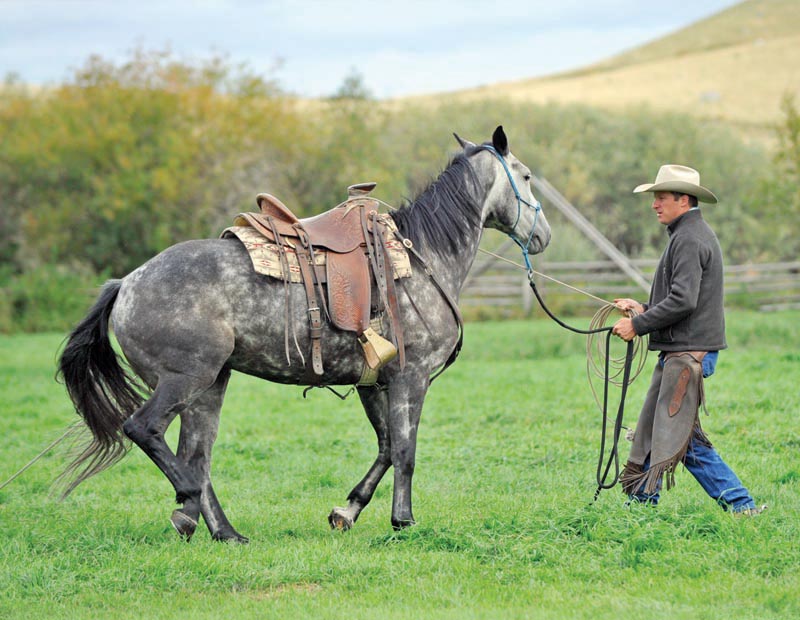
Above: Here you can see he noticed the rope’s touch, and with a little spook over he is showing he doesn’t like it. The good news is that, because of the way everything is organized, I can simply let some rope drift through my fingers and allow him to turn and relieve the pressure on himself by moving away from the rope touching him. Then I can repeat and return to this moment again, showing him it won’t hurt. It will come and go – “go” being the key to building confidence. Photo: Robin Duncan Photography
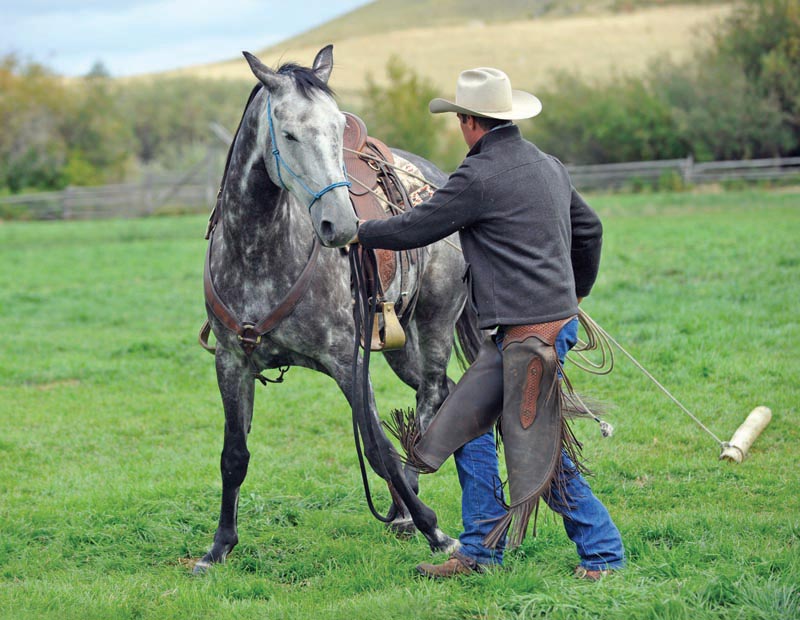
Above: Progressing a bit further over the next few minutes, we use the approach-and-retreat method of letting it touch and taking it away. He soon understands that it won’t hurt him. Photo: Robin Duncan Photography
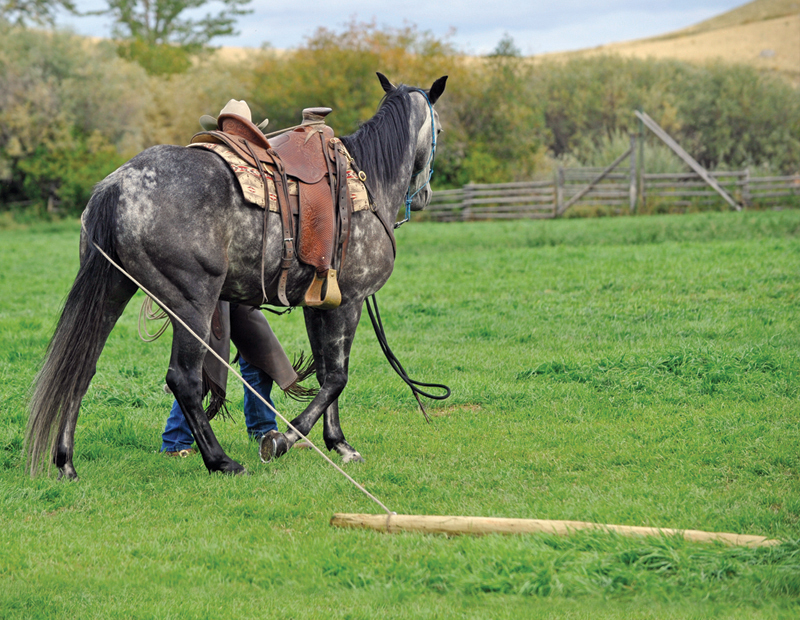
Above: This is a very big step of progress where the rope is not only around his hindquarters but he can see it moving in his opposite eye. It takes a significant amount of time and experience to get to this point. If he’s going to be okay dragging calves at branding, I need him to be able to do this. You can see he is aware of it with his right eye and ear but trusting me as he walks forward confidently. Photo: Robin Duncan Photography
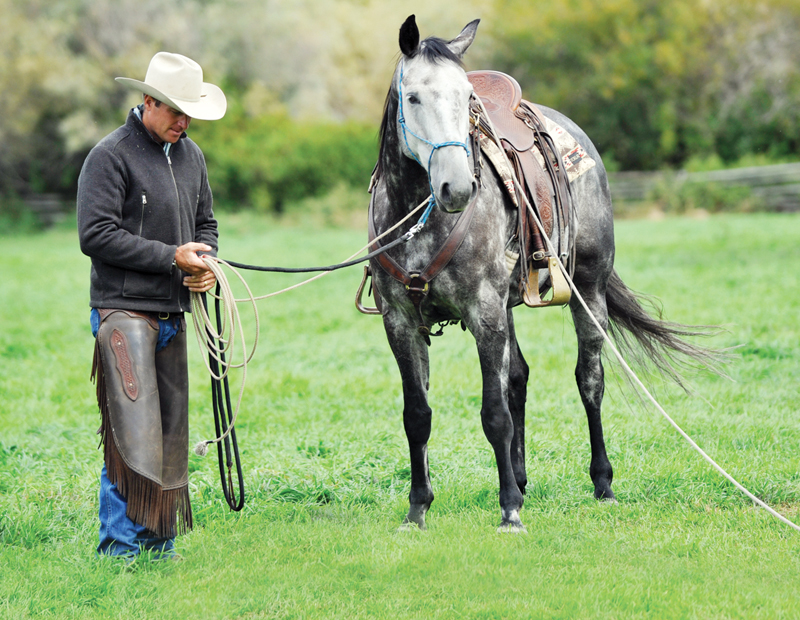
Above: Finding a nice moment to finish off is always important. Here he’s aware of the rope with his left ear but he’s more relaxed and content with it. I’ll hang out with him with the rope dangling off the saddle horn for another 10 or 15 minutes to solidify this lesson. Photo: Robin Duncan Photography
At the time of writing this article, I had had Geo about six months. The first three months were focused on ground skills. Since Geo had never been ridden, I did a complete restart with him. During that time, it was all about building trust, communication, and leadership so that, when faced with a bit of trouble, he can look to me to help him through it. It is fundamental to me that I help my horses through trouble and not avoid situations, so they learn to cope with any changing circumstance. I don’t constantly go looking for trouble; it’s a balance. Our horses need a lot of “good time” with us so they have something to go back to when they get worried.
I hope this helps give you some idea of how to progressively yet slowly build up your horse’s confidence around his personal space bubble with moving objects.
In Part 2, I take these lessons and show how you would progress to the riding stages using a different series of exercises to achieve a similar result. Go to Build Your Horse's Confidence – Part 2.
Stay inspired by horses!
Related: Slow Down and Start a Horse Right
Related: The Anxious Horse: Working Through Tension
Main Photo: Robin Duncan Photography



